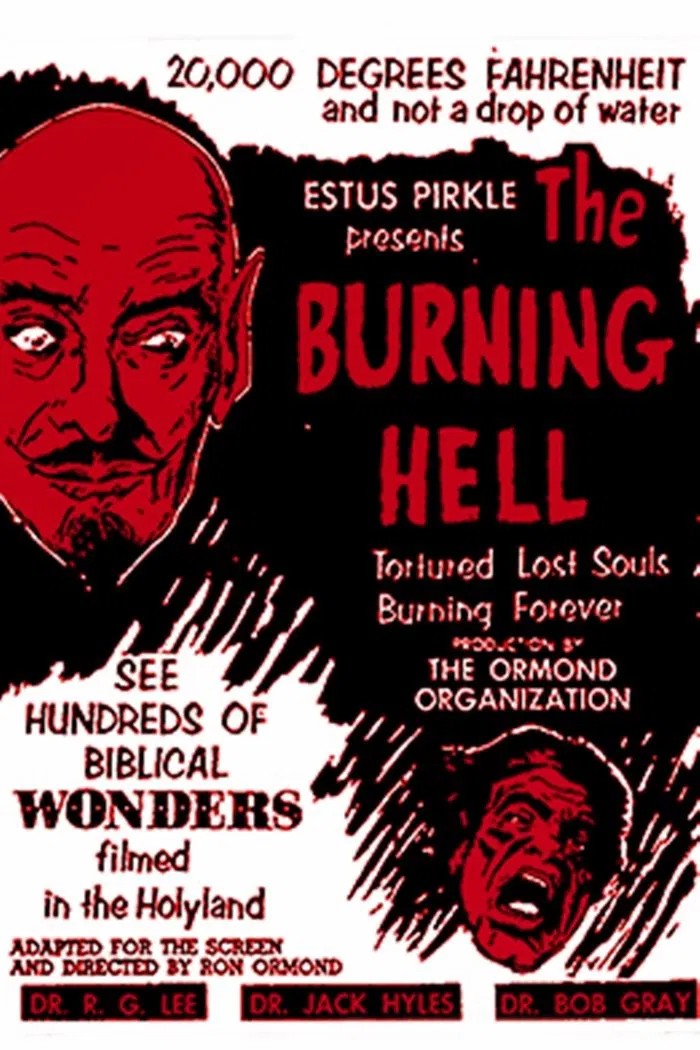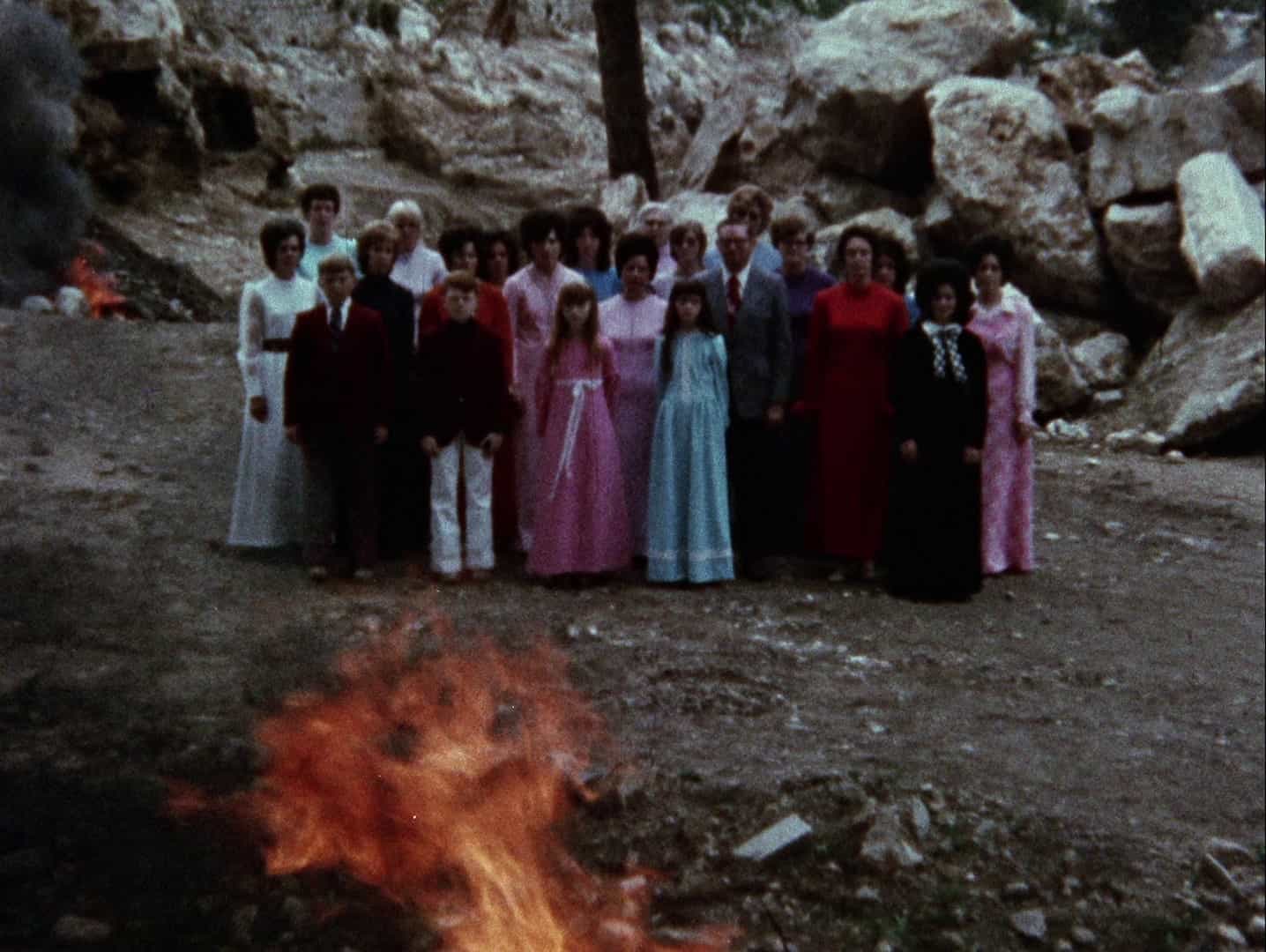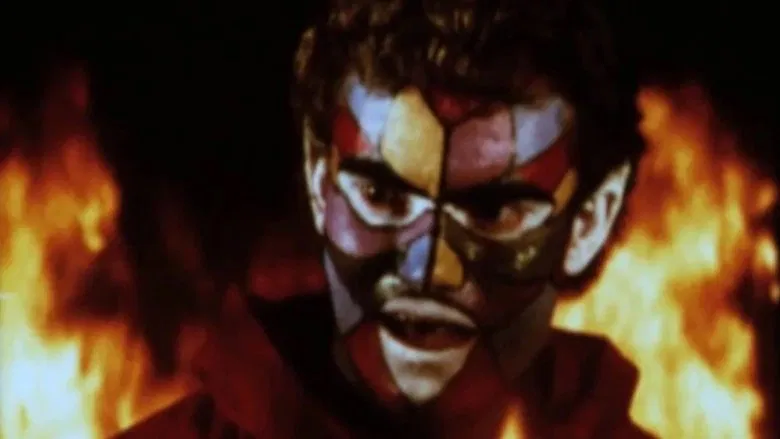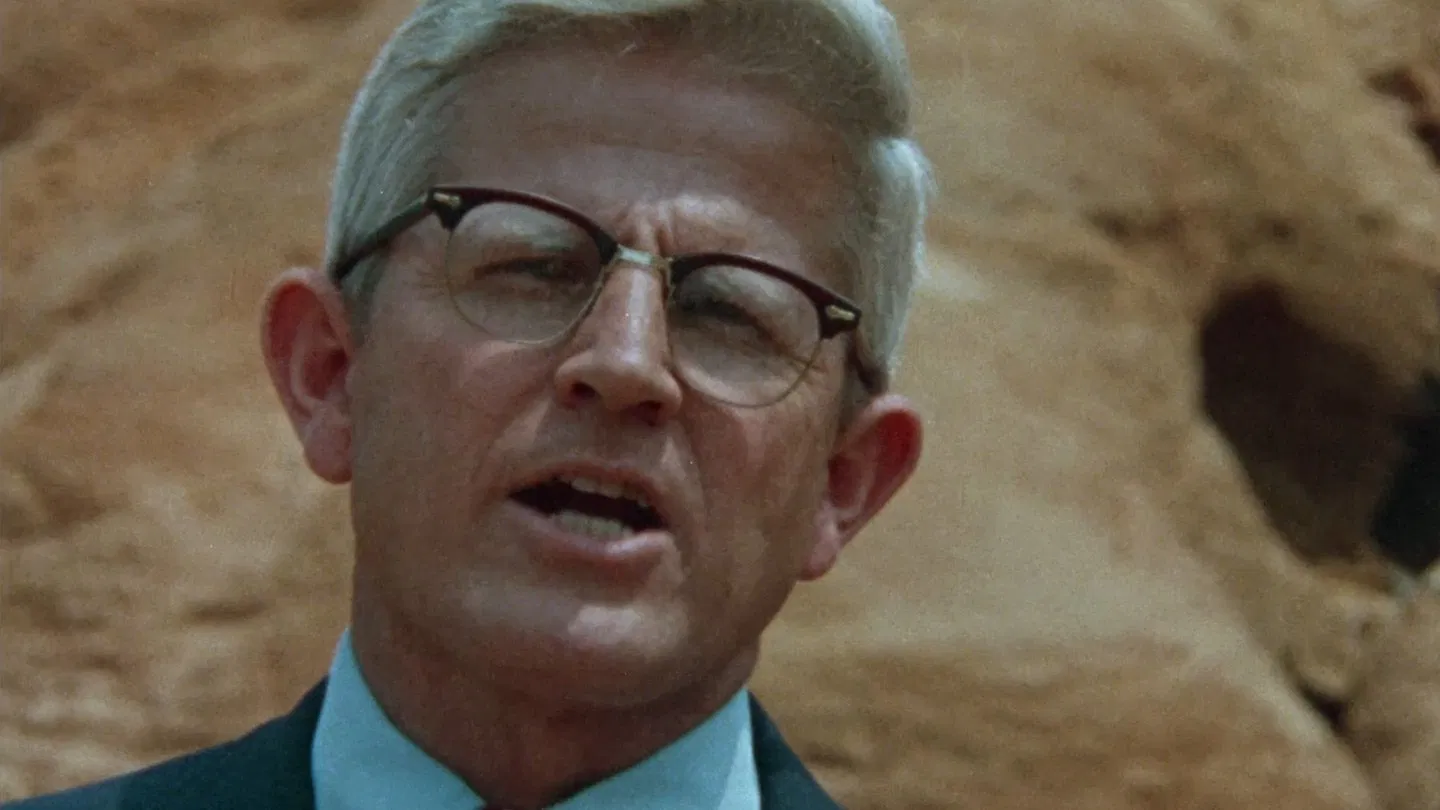The Burning Hell (1974)
dir. Ron Ormond

Take my hand. Let us say grace.
O Lord, who art our Father in Heaven, bless this review. Baptise me in battery acid and cleanse my spirit. Wash away my doubts and grant me a lust for Canaanite blood. Exalt thy people with the flesh of thy lamb so that Mike Johnson may remaineth the Speaker of the House after the midterm elections.
Amen.
⁂
Anyone familiar with the many flavors of Southern Baptists will immediately notice Estus Pirkle’s affection for the King James Version. He decorates his sermons with early modern English, doth and forsooth and the Lord punisheth the wicked, et cetera; he backs up his theological claims with rapid-fire quotations, entire passages committed to memory, inflecting the gospels like beat poetry, like an incantation. The congregation cannot possibly hear and understand every word being spit over them, but they nod along anyway, because once you’ve heard a verse enough times, the entire verse takes the shape of a single word. Not a collection of words, not a sentence, subject-verb-object, but a single unit of meaning. Scripture becomes an interjection, an intensifier, even an expletive. Angrily mutter the Lord's Prayer after stubbing your toe. Recite Matthew 25:41 and clutch the cross on your neck when a woman shows her midriff at the farmer’s market. Americans love their little spells. We train our children to chant the Pledge before first period, to grind the grammar of the Republic down to a fine powder, which is then packed into a daily patriotic pill. What the Founders said with righteous passion, we mumble with monotone obligation, and maybe a little spite. We Americans can make a religion out of damn near anything.

Estus Pirkle doesn’t preach to inspire his congregation to study the Bible and sign up for seminary school. He preaches to shepherd his flock away from what he sees as a forever-burning field of decapitations, bell-bottom jeans, and Harley Davidsons. He doesn’t want his parish to grovel in mud and flames for all time, but to ascend to the Eternal Barbecue, the Neverending Vacation, the Infinite Sunday Afternoon. Heaven is your fondest childhood memory; Hell is the inside of a blast furnace. Heaven is a baseball field in Iowa at sunset; Hell is the bathroom at a truck stop in the middle of nowhere. Hell is hot, hot, hot. When Pirkle assures the profligate biker boy that the Bible confirms the existence of Hell, he doesn’t bother with the Greek or the Hebrew. He doesn’t dust off his Oxford Annotated, he doesn’t consult the Septuagint. No, he simply points a stiff finger at the sinner’s chest and scolds him for committing the heresy of annihilationism. It is not enough that you know the Nicene Creed by heart and believe every word, O fair-weather “Christian.” It is not enough that you pray before every meal and teach Sunday school and secretly evangelize to your kids’ friends when they sleep over. That is insufficient. You must also believe the great Christian revenge fantasy. You must also reject the apostate Unitarians and Manicheans and Conditionalists and (worst of all) Partialists. The soul is forever, and Hell is real, and Hell is forever, and remember this: God is just as vindictive as He is loving. No punishment can equal the sin of ignoring Pastor Estus Washington Pirkle. Have you heard the Good News? All of your coolest friends will hate you forever! There is no friendship here. Satan is not serving jello shots and hors d'oeuvres on the shores of the frozen lake. The Good News is that everyone and everything is royally, irrevocably, incomprehensibly fucked up.
Pirkle is right that Christian dogma largely accepts the existence of an eternal realm of punishment for nonbelievers. But why bother with exegesis when a propaganda film will do the trick? A gory beheading is much more persuasive than a scholarly discussion of Pauline theology. Fake blood and creepy facepaint will save a lot more souls than a dry cultural comparison of Sheol, Hades, and Hell. Pirkle’s brand of brimstone is at least more honest than what you’ll find in Baptist megachurches now, where troublesome verses are airbrushed by the New International Version, where God sent a bear to slaughter “youths” instead of “little boys,” 2 Kings 2:23–24, where the Bible never contradicts itself across the centuries. Either way, the point is not to resolve the Bible’s inconsistencies, but to celebrate them as evidence of the Truth. Divinity refuses mortal understanding, you see. Our Father favors the United States and protects us from the barbarian Communist hordes. Our God has a penthouse on Wall Street and a direct line to Congress. God bless America, God bless our troops, and GENTLEMEN! REV!! THOSE!!! ENGINES!!!!!!!!
⁂
It’s hard to accept that we share this planet with people who unironically embrace The Burning Hell’s version of reality. We’re somehow supposed to coexist with people who believe that anyone outside their tiny religious bubble, anyone outside their little sub-sub-subsect of christendom, is condemned to permanent suffering in the afterlife. If you, like Fran Lebowitz, resist the liberal urge to psychoanalyze your opponents, you will come to view such people as a cancer—as fundamentally incompatible with organized society, as barnacles on the underside of civilization that, if left to grow, will cause the whole boat to capsize—but we can’t scrape them off without betraying the enlightened principles that the system serves to promote. The only morally consistent solution to the paradox of tolerance (that I’ve found) is to point and laugh at Ron Ormond’s crazy movie and hope that we can overcome the Pastor Pirkles of the world through slow, incremental progress. Packing the Supreme Court under President Ocasio Cortez, or rehabilitating the public image of Hunter Biden on TikTok, or posting about the Epstein files on Bluesky. Here’s your choice: either kneel at the altar of Dolores Dei, or follow your Mazovian dreams to an early grave (or secret option C: start smoking cigarettes and listening to degenerate EDM). Make up your mind—and soon.

If you don’t resist your liberal urges, if you engage in a little performative empathy, as a treat, then you’ll find the humanity in Hell. It feels good, really good, to believe in a Hell, because the universe is doomed, because entropy will always win in the end, and because God has created an Earth where good people die in unimaginably awful ways. Where death and pain are wholly random, where a lifetime of karma can’t protect you from landslides, muggings, and riptides. It feels good to believe that a criminal who dies of a heart attack “earned” their fate; it feels good to believe that a politician “deserved” the plane crash that killed them; it feels good, better than sex, to believe that the oil magnate who passed away in their sleep after a full life will get their just desserts in the hereafter. It’s consolation on one hand and vindication on the other. It’s the comfort of hellfire, the warm embrace of a pitchfork, the soothing sound of infernal torture. It’s the death penalty. Of course Dante Alighieri’s personal enemies ended up in the Bad Place; of course the leftist heathens will atone and beg for forgiveness, asking “why didn’t I listen” as the Devil rakes them over hot coals and feeds them to hungry crows; of course we were right all along. They should have listened. They’re listening now, ain’t they?
In an interview conducted ten years after Estus Pirkle died and ascended to Heaven, alleluia, praise the Lord, his wife Ann Pirkle said that “the Hell film has been shown I guess twice as much as the other films.” Despite this, her husband “loved all of them. In fact, he thought that the Hell film would probably be the most shown because he talked to Brother Ray who told him that in the Bible there’s more about Hell then there is Heaven. I didn’t know that but he said emphasis is put more on Hell than on Heaven. Estus was kind of surprised that most people wanted to see the Hell film more than The Believer’s Heaven.” But Ann, I’m surprised that Estus was surprised. Estus should’ve known, with all his experience at the pulpit, that revenge is more delicious than salvation. That we may find comfort in the Gospel of Matthew and fear in the Pentateuch, but we salivate over Revelations. We are aroused by its promises of war and famine and gnashing of teeth after we believers have already gone on home to Daddy. Those lions and monsters and pests get us all hot and bothered. We smile because We have been Chosen, yes, but We rejoice because They—the teeming, unrepentant masses—have been Damned. Here in old Dixie, we replace Catholic guilt with Baptist smugness. God is watching alright, and He likes what He sees. Now pass around that golden platter. We need some cash to build a new annex.
The revenge fantasy is a pillar of fundamentalism. To believe in a good and forgiving Lord is to condemn your soul to a Hell you don’t even believe in. Isn’t Christianity just so appealing? Doesn’t the threat of Hell make you want to join a church? Don’t you want to sign up for the ladies’ group and make brownies for the annual bake sale?
Deep down—deep in your wrathful, chthonic heart—don’t you feel drawn to the Republican Party? Don’t you want to be ruled, Springfield?
⁂

Here’s what I’ll tell you about growing up in the Southern Baptist church.
The meanest kid at Vacation Bible School will raise his palm to the sky and beg for the Lord to fill him up. While your friends fuck in the dorms at Christian summer camp, you’ll be throwing rocks in the creek and reading a devotional about Christlike masculinity. The kid nicknamed Fish will tell you that Catholics aren’t really Christians because they worship Mary. Lunch will be a cracker and a spoonful of peanut butter. At the nightly worship service, as the speakers blast holy rock music into your skull, as the God High begins, you will believe like never before. You will sing all night long. Then you’ll wake up the next morning, almost hungover on praise and fellowship, and the faith will be… just gone. Completely gone.
By the time our youth pastor handed us booklets about converting our friends, I had already checked out. By the time a girl stood in front of our youth group and told us how she visited a Hindu temple and felt the presence of Satan, I was all out of religion.
I was tired of talking about God. I was bored of sin and redemption and the end of the world and the Left Behind series. I couldn’t understand why everyone wanted armageddon to come. It sounded terrible. How could you enjoy the green pastures of Heaven while billions of innocent people writhed in agony below? How could you want that? If God had raptured me, I would have fallen to my knees and begged Him to send me back. I would not have rested in peace.
The afterlife suggested by Estus Pirkle—the erasure of the self, and the integration into the divine manifold—the heavenly hivemind—is the work of a cruel and indifferent God. If it is true, as Romans 8:38 tells us, that “neither death nor life, neither angels nor demons, neither the present nor the future, nor any powers, neither height nor depth, nor anything else in all creation, will be able to separate us from the love of God,” then count me out. I want a little separation. I need my personal space. I fucking despise open concept, okay? I need walls I can stare at and doors I can slam. My Hell is the ginormous kitchen from Something’s Gotta Give. My Hell is a trendy urban church with a logo written in Helvetica. My Hell is right here, right now, and I don't want to leave it. My Hell is better with you, / ‘cause we’re burning up together, baby, that makes two.
Now turn to your neighbor and greet them. Now turn away from the Sodomites and Democrats. Now take this shot of grapejuice and chew this stale nodule of bread. Let the wax drip over your fingers like a good little sinner.
That's it.